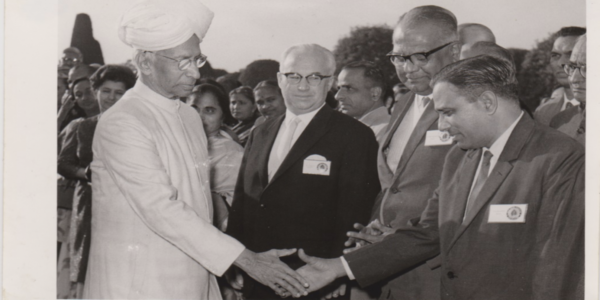VISH MURTHY
The third Sunday of June of each calendar year is marked as Father’s Day here in the US. The day was first celebrated on June 19, 1910 but gained nationwide prominence only in 1972.
For me, personally, it has been the 43rd roll of the calendar, and a bottling of his memories, all this while. I had rarely confided in anyone as to what he meant to me.
But this year, something made me break that cycle. I decided to share the beautiful life of a father I once had.
It was in 1980 that I received my first emotional and severe jolt to my adult life, when I received the news that my father was no more. I was still a student in a university campus in New Jersey, struggling my way out of difficult economic and personal circumstances, when any dream that I may have had for my parents came crashing down.
My mother too would pass away three years later. Both of them had died young at 60, and with my father having tasted just a couple of years of retired life back in his beloved Bengaluru.
My father’s death lay bottled in me for many years. Being an only child, there was also no one around to share it immediately with. Also, not having sufficient bandwidth to cope in those early days, and in no position to go to India to attend to his funeral rites, I had blocked all my thoughts on grieving for a father, or in comforting a mother. Consequently, I developed a fatalistic outlook, a major mistake.
With life becoming more stable, the grief that I had frozen for years now started to thaw. A bond that I had cultivated in a sacredness of observing him, during my own formative years, now began to unfold frame by frame. I know that for almost everyone, one’s parents are always the most precious. But I knew that there was a unique significance to my father’s nature that I could never wrap around sufficiently in my head, so I rarely expressed my sentiments about him to others.
It was only recently that I realised what it was that had made me look up to him, almost revere him – a simple curio of an instructional set of three figures advocating that humans must not to hear any evil, speak any evil, nor see any evil, which I saw on someone’s tabletop. It suddenly dawned on me that my father had been a living and seamless embodiment of all that was being advocated. He had not “chosen” to be those qualities; he had lived them organically.
No matter what his own problems were, he never complained, you never saw him in anger, perhaps just a quick clouding in bewilderment or sadness, but always with a quick revert to a sincere, gentle smile, towards anyone that he met.
Growing up, ours was a colony life around the Maithon dam in Bihar. It was at the bend of India’s destiny, when the country had found itself free from the British. Freedom was still afresh in the air, and there was great anticipation of things to be achieved. Five-year plans were to be devised, steel plants to be built and rivers to be tamed. Things were projected towards socialism, but how else was a giant country coming into its own, for the first time, supposed to bridge a huge divide between the haves and the have-nots. Lest the country with its large diversity and population began slacking, there was always Nehru, the prime minister with a mercurial drive, prodding you – “Aaram haraam hai” (complacency was forbidden).
He had loved Maithon Dam, where we were now living, and he had made it his personal showcase to indicate India’s new willingness to forge ahead. As a boy, I had developed very vivid memories of gawking at a whole lot of world leaders behind our very home, coming to see the Maithon, Pamela and Lord Mountbatten, Bulganin and Khrushchev, Gamal Abdel Nasser and even China’s Zhou Enlai.
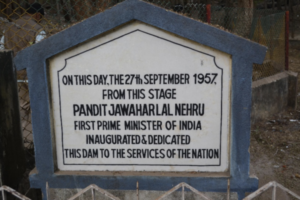
The Boston Globe of December 10, 1957 in a feature “India Dreams of Own ‘Ruhr Area” sought to tell us, in an encapsulated form, what may have caused someone like my father, during those times, to leave Bangalore and to seek an employment up north. It writes:
“In 1943 the Damodar River flooded. This was not unusual for the 336 mile stream, which rises in ‘western Bihar State and flows into the Hooghly River 30 miles below Calcutta. But in this flood the great port of Calcutta was cut off from the rest of India for three weeks. It was a critical period in World War II when a Japanese invasion was executed. U.S. experts were called in to study flood control possibilities. From their blueprints the T.V.A. (Tennessee Valley Authority) of India was born. It is known as the Damodar Valley Corp, (DVC). Today four dams at Tilaiya, Konar, Maithon and Panchet Hill control the Damodar. The Valley is rich in resources. While Indians like io call this area their TVA [a version of Tennessee Valley Authority] they are looking ahead to a bigger dream of the Damodar Valley as the Ruhr of India. The valley has rich deposits of coal, iron, manganese, and mica.]”
In order to realise those dreams of completing their Ruhr valley, India had also turned to the US for help, and subsequently appointed A.M. Komora of Chicago as DVC’s Chief Engineer to oversee the construction of those dams. He was appointed on December 2, 1950, and successfully saw the DVC complete its major tasks. Nehru inaugurated the Maithon dam by 1957, and Komora finally left with his wife Lucille and granddaughter Andrea to go back home to the States in 1959. There was quite a lump in many staff memers’ throats the day they came to bid farewell to the Komora family.
While our colony life had been busy as the dam was being constructed, with the sound of the dumpers excavating the earth, it soon descended into a dreary disposition once the dam was completed. Along with the Komoras, others, Indians, too left for wherever they had come from to look for newer pastures. Many of my friends had gone, and I became a loner, a dreamer. It was at this time that my father’s life, too, came into a sharper focus with me.
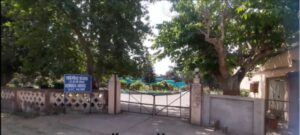
He was born to parents in Srirampura (Malleshwaram), had attended National College and had done his civil engineering from Bangalore University. The rest of his service life was in the Damodar Valley Corporation in the state of Bihar.
He had been brought up in a highly conservative family in the Vedic tradition in Bengaluru, and by a father with an extremely strict Vedic priesthood with codified morals and scholarly leanings. But his dealings with the world were in the most cordially balanced of ways, gentle and completely liberal in outlook. He never projected orthodoxy, never imposed it nor talked about it to anyone including me. But he did practice his faith within those traditions, each day, without fail, and just in keeping it all to himself. Each morning he made sure he rolled out only on the right side of a bed (in a duality of life the right side being positive), face east towards a rising sun, look towards the palms in an invocation to three goddesses and silently beg a benediction to his life. This would be followed by a daily bath and prayer to the Gods, before he would put a morsel of food into his mouth. Somedays, I would catch him ever so gently bathe each god, wipe them delicately before restoring each figurine to a traditional order on the mantel piece, chanting the prayers ever so quietly.
Between 1959 and 1966, my father may have experienced some of his most drudge years. He was not making much headway in his career and there were not many challenges coming to him officially. All our neighbours had departed, some even enviably to the US, from where they would occasionally send a greeting card or a small local paper cutting of an interview on how they were doing. The village wore a desolate look, with empty spaces, no form of maintenance, scorching summers and nothing to excite a person by way of an event or even a restaurant. To dream of an outing, we would have to make it to the town of Asansol, 16 miles away. My mother too, at this time, had become his harshest critic. She felt that my father was not being considered by anybody for anything, because he was such a “goody two shoes”. Even the card and tennis playing spirited few at our local makeshift club had stopped looking for him.
But he had trudged on.
Somewhere, in his very innocent mind, he had cultivated the old adage that rights imply duties. So, even during those years when life stood still, he had made himself useful, because he felt that he was drawing a salary. He had come around to ask of himself, “Okay, a dam gets built, and there is less flooding, better irrigation and more electricity. But what happens to a dam by itself? How long does a good thing last?” And so, he turned himself to becoming a student, again, on his own. He turned his attention towards the dams of the world that were built. He found out who were the pioneers in the Bureau of Reclamation in Colorado and in his own innocent way he started to pen letters of gratitude to officials, there, commending their work, and seeking a question or two by a way of tapping into their knowledge. Very soon, he was bringing home quite a load of work. His object of study now was siltation, life of a dam, and how sedimentation eats into the latter’s life.
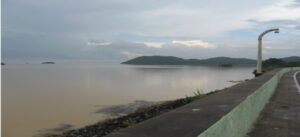
During those years in the early ’60s, I would be away from home in college, but each time I came home for the holidays, I could feel the cheerlessness of the place. But sometime around 1966, I could sense changes coming in the wind. My father had suddenly started to feel busy; there was a different kind of smile to his face, an anticipation, a renewed energy; we were suddenly playing host to guests coming from the government in Delhi; there were mention of new American names like a Dr. Voorduin, a Whitney Borland, a Dr. Pemberton, a Carl Brown and more frequent mentions of Indian names as in a Dr. A.N. Khosla, a Dr. K.L. Rao and a host of others.
There was even the mention of a boat and an import of something called an “echo sounding machine” and the exciting sounds of some pioneering work going on. There was even the mention that my father was preparing plans to head up a new division, and that he was starting to gain a groundswell of support in Delhi. For me the biggest thrill was to hear that we would soon be owning a car, for ourselves. In a status conscious world, we felt we had finally made out with some dignity to our lives. I felt a glowing attachment to my parents, particularly for my mother, who had come from a well-known lineage in Mysore, but who had sacrificed any interests she might have had. For me and my parents, boot-strapping ourselves into making something out of nothing, had become the mainstay of our lives.
Even on one of the happiest days of his life, when he was granted a first trip to the US, he went to the US embassy in Delhi only to be told that he had contracted diabetes, and that he had to postpone the trip, and which may not happen, until he took the proper steps and be cleared medically.
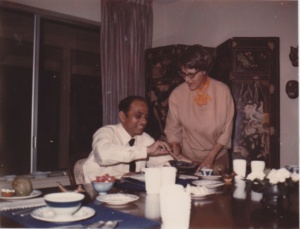
Finally, sometime in 1970, he did go on his first trip outside India, to spend some of his happiest months in the US, visit some of the old Americans who had earlier been in Maithon, and for a long time spoke glowingly, to all of us, of the beautiful Christmas and New Year celebrations in Denver Colorado. By the time of his return, my mother had chosen to spend his absence, with family in Bengaluru, and I too happened to be there on my first job after wrapping up college. On the day of his return, I was assigned to greet him with others at the airport and give him a rousing welcome. But I had my wires crossed that day in terms of the time difference between the two countries, and missed receiving him. It was a profound surprise for me to find him alighting from a cab all by himself, picking up his luggage on his own and showing up at the doorstep where we lived. So much for a hero’s welcome! The memory of it still haunts me, to this day.

But he always had this other quality called a “Titiksha” in Sanskrit, a calm fortitude. He withstood anything thrown at him with a smile, and he prevailed, never registering a complaint on any matter. Lady Luck finally relented and smiled at him over the next few years. His widely covering work in the field of Hydrology, in Siltation, got published by the Government of India, he was promoted to a Directorship, made a few more trips outside the country, and was further honored by the Government of India with a silver medal. My most wistful encounter with him, came in a phone call that I made to him in Paris in 1975, as a student in Brooklyn, NYC. He was taken completely by surprise, as it transformed itself into welt of tears. He sobbed in happiness. His own dam of years of contained disappointment had finally burst into happiness on hearing my voice. I had never heard him like that before.
(Courtsey: The Wire)
Vish Murthy is a retired computer scientist who lives in New Jersey, US.
His family was the patron of many Carnatic musicians including the legends T. Chowdiah and M.S. Subbulakshmi. It is the family trust that built the Chowdiah Memorial Hall.

